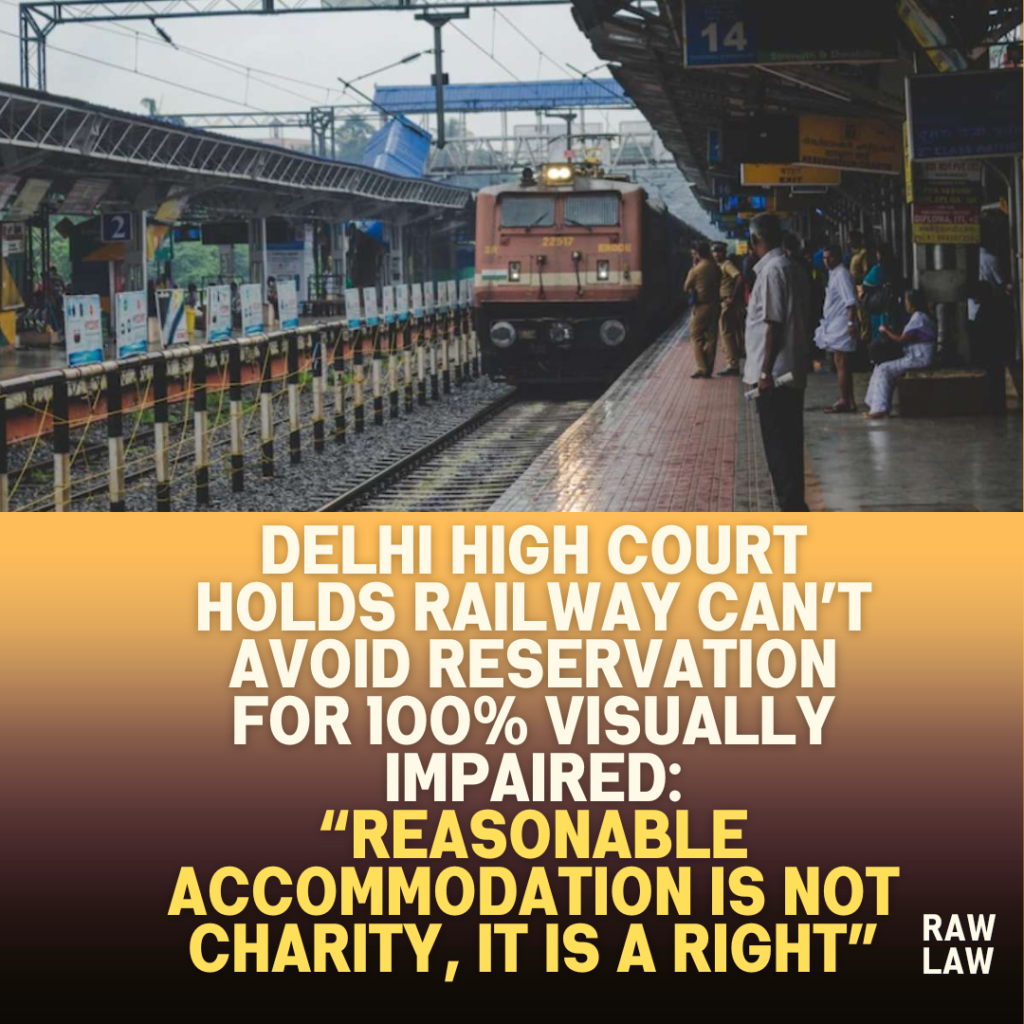Court’s Decision
The Delhi High Court held that Western Railways and associated Railway Recruitment Cells (RRCs) cannot deny reservation to candidates with 100% visual impairment under the Persons with Disabilities Act merely by stating the posts were not identified for them. The Court directed the Railways to reconsider the petitioners’ candidatures under the quota for visually impaired candidates in light of the law and to explore possibilities for providing reasonable accommodation.
Facts
Petitioners, all candidates with 100% visual impairment, participated in selection processes conducted by various Railway Recruitment Cells. They challenged the non-selection on the ground that the Railways failed to reserve appropriate posts for persons with 100% visual impairment as mandated under the law, citing insufficient posts identified for such candidates. The petitioners asserted that their non-selection was a violation of their statutory rights under the Rights of Persons with Disabilities Act, 2016, and that the Railways’ justification of posts not being “identified” for them was untenable.
The Railways, however, defended their position stating that the recruitment was made only against posts identified for visually impaired persons, and no suitable posts were available for those with 100% visual impairment, making them ineligible.
Issues
- Whether the Railways can deny reservation under the Rights of Persons with Disabilities Act, 2016 to candidates with 100% visual impairment by claiming that posts were not identified for such candidates.
- Whether non-identification of posts for 100% visually impaired persons can be used to circumvent statutory reservation mandates.
- Whether the Railways are obligated to provide reasonable accommodation to such candidates.
Petitioner’s Arguments
The petitioners argued that under the Rights of Persons with Disabilities Act, 2016, reservation for persons with benchmark disabilities, including 100% visual impairment, is a statutory right. They contended that the non-identification of posts for them could not override the statutory mandate of reservation and that the Railways were under a legal duty to explore possibilities for providing reasonable accommodation, which is a right and not charity. It was argued that a mechanical refusal based on non-identification defeats the purpose of the legislation and violates their fundamental rights under Article 14 and 21 of the Constitution.
Respondent’s Arguments
The Railways argued that the recruitment was conducted strictly following posts identified as suitable for visually impaired candidates and that due to operational requirements, certain posts could not be identified for 100% visually impaired persons. They contended that recruitment against non-identified posts would compromise operational safety and efficiency and that the Railways had complied with the law by providing reservations to the extent posts were identified.
Analysis of the Law
The Court analysed the Rights of Persons with Disabilities Act, 2016, focusing on Sections 33, 34, and 35, which mandate reservation for persons with benchmark disabilities. The Court emphasised that non-identification of posts cannot override the statutory obligation of reservation and held that the principle of reasonable accommodation is integral to the implementation of such reservation. The concept of “reasonable accommodation” under Section 2(y) requires the employer to take appropriate measures to enable persons with disabilities to participate equally.
Precedent Analysis
The Court referred to:
- Vikash Kumar v. UPSC (2021), where the Supreme Court held that reasonable accommodation is a substantive right under the RPWD Act.
- National Federation of the Blind v. UPSC, which emphasised that identification of posts should not be used to nullify the reservation policy.
- Rajeev Kumar Gupta v. Union of India, where it was held that reservation must be provided in all posts unless it is shown that the disabled person cannot perform the required duties even with reasonable accommodation.
These cases were relied upon to clarify that reasonable accommodation and reservation are mandatory obligations, not discretionary measures.
Court’s Reasoning
The Court reasoned that the Railways’ approach of using non-identification of posts as a ground to deny reservation is legally untenable and contrary to the spirit and purpose of the RPWD Act. The Court held:
“Reasonable accommodation is not charity; it is a right flowing from the statute that must be practically enforced.”
The Court observed that the burden lies on the employer to demonstrate that the work cannot be performed even with reasonable accommodation before denying reservation to persons with disabilities.
Conclusion
The Delhi High Court directed the Railways to reconsider the petitioners’ claims for recruitment under the quota for 100% visually impaired candidates and to examine the feasibility of providing reasonable accommodation within six weeks. The Court clarified that unless it is impossible to provide accommodation without compromising safety and efficiency, the Railways cannot deny employment under the garb of non-identification of posts.
Implications
- Strengthens the interpretation that statutory reservations for persons with disabilities override administrative non-identification hurdles.
- Emphasises reasonable accommodation as an enforceable right, not a discretionary measure.
- Sets a precedent for other public sector undertakings to review recruitment processes to align with the RPWD Act and constitutional mandates for equality and non-discrimination.
FAQs
1. Can government departments deny reservations to 100% visually impaired persons citing non-identification of posts?
No, the Delhi High Court held that non-identification of posts cannot override the statutory mandate of reservation under the Rights of Persons with Disabilities Act, 2016.
2. What does the term ‘reasonable accommodation’ mean in employment for persons with disabilities?
Reasonable accommodation refers to necessary and appropriate modifications to enable persons with disabilities to participate equally in employment unless it imposes a disproportionate burden.
3. What should a visually impaired candidate do if denied recruitment citing non-identification of posts?
Such candidates can challenge the denial, relying on this judgment and similar precedents that clarify reasonable accommodation and statutory reservations are enforceable rights.
Also Read: Delhi High Court Clarifies: “Ad-Interim Maintenance Is Not Automatic, Must Be From Order Date”
